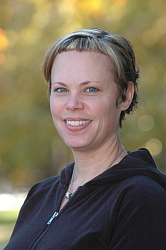Jill Stauffer joins Haverford Faculty as Assistant Professor of Philosophy

Details
Haverford's new assistant professor of philosophy Jill Stauffer just started work in September, but to many on campus she was already a familiar face. That's because Stauffer, who received her Ph.D. from the University of California at Berkeley in 2003, spent four semesters here (2005-2007) as a Mellon Post-Doctoral Fellow with the Hurford Humanities Center.
During that first sojourn at Haverford, Stauffer taught philosophy courses, participated in a faculty seminar on Representations of Political Violence and Terrorism, and organized a symposium titled“Seeing Justice Done: Interrogating the Margins of Law.”
That symposium invited philosophers, political scientists and legal historians to provide different takes on the dividing line between law and justice, says Stauffer.“There can be a disconnect between what the law does and what people see as justice. That's what truth commissions are about, for instance. They attempt to make up for what law can't accomplish.”
Philosophy of law and political philosophy are major areas of intellectual focus for Stauffer, who has taught at Amherst College in the Program in Law, Jurisprudence and Social Thought, and at John Jay College of Criminal Justice at CUNY. At Haverford, Stauffer will be responsible for helping to reshape and direct the Haverford College component of the current Bi-Co concentration in Peace and Conflict Studies, which will become the Peace, Justice and Human Rights program.
“The new concentration will be interdisciplinary,” she says. “And it will be something that can be added on to any major. My purpose is to get students thinking across the disciplinary boundaries and maybe come up with creative solutions to entrenched problems.”
Stauffer has already begun that effort in the course she is teaching this semester called Introduction to Peace, Justice and Human Rights. In this new course, says Stauffer,“We are asking: What is a human being? What is a human right? What is the difference between a human right and a civil right? We are looking at history, philosophy and case studies to see the different ideas people have had about these questions. And we're looking at how history and philosophical questions are reflected in current real world problems.”
Another avenue of philosophy that Stauffer finds especially compelling is ethics, particularly the question of how we define our responsibilities, and the limits of those responsibilities, as human beings. She has written extensively on the work of Emmanuel Levinas, a Lithuanian-born scholar who emerged as an important moral philosopher in post-war France.“What I like about Levinas is that he helps show what some of the limits are to a purely rational account of ethics,” says Stauffer, who is co-editor of the book Nietzsche and Levinas:“After the Death of a Certain God“ (Columbia, 2008).“He gives us a new way to think about what is to be a human being that might suggest why people might care about human rights, even for people they might not like or will never meet.”
Stauffer, who grew up in California and spent most of her formative years in the San Francisco Bay area, earned a B.A. in classical languages at UC Berkeley before turning to philosophy. “I ended up in classics because I liked greek lyric poetry,” she says. On a trajectory to do graduate study in classics at Cambridge University in the UK, Stauffer decided that this“small, cloistered” world was not for her and switched to Berkeley's department of rhetoric.“It's Berkeley's quirky department where you can do whatever you want,” says Stauffer, whose dissertation combined political theory and philosophy.“But with a degree from a department of rhetoric, I've spent most of my post Ph.D. life explaining to people what I do and why I am qualified for their jobs. Most people think rhetoric is a bad word, that it's something politicians use to manipulate people.”
It was during her graduate school years that Stauffer began putting out a literary philosophy magazine called h2so4. This twice-yearly“labor of love”/art project endured for nearly a decade and was nominated for an Alternative Press Award for a number of years running. The magazine's title, says Stauffer, refers to the chemical formula for sulfuric acid.“In medieval alchemy sulfuric acid was supposed to turn lead into gold, which is an allegory of the search for knowledge,” she says.
These days, Stauffer keeps her hand in the alternative press world as a regular contributor to The Believer magazine, a monthly journal of art, literature, politics and popular culture that features a sardonic advice column by actress and writer Amy Sedaris and edgy cover illustrations by comic book artist Charles Burns. Stauffer interviews philosophers for The Believer, which is a project of McSweeney's, the independent publishing company founded by author Dave Eggers.
“It's really fun to translate someone's work for the general public, and I get to decide who is a philosopher,” says Stauffer, who has interviewed a law school professor and a criminologist, among others. Stauffer's down to earth criteria for who makes the grade:“Anyone who is working in the area of ideas, and putting forth new ways to think about things, is practicing philosophy.”
-Eils Lotozo



